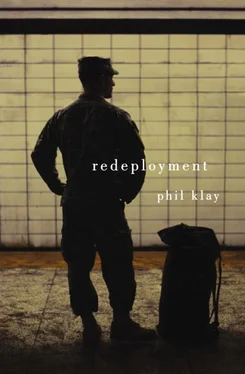“So you don’t pray,” she said, “because…”
I laughed. “I pray,” I said. “But not to Allah.”
She frowned a little and gave me a look that let me know I was never going to sleep with her.
“So you see, I can kill Muslims as much as I like,” I said, smiling. “Shit, in my religion, that’s how you help an angel get its wings.”
• • •
I thought of it as a mild comment.In the Army it wouldn’t have raised any eyebrows. And though Zara had stiffened up and ended the conversation a bit curtly, I hadn’t thought her especially bothered. But two days later, I found myself face-to-face with the Special Assistant to the President for Diversity and Inclusion, a round little man with a potato head nestled on fat, fleshy shoulders. I’d met him before. As a veteran and a Copt, I was the most diverse thing Amherst had going.
At the time, I didn’t even know what I’d done. The e-mail said I may have violated the provisions in the Amherst student honor code related to “respect for the rights, dignity, and integrity of others,” with particular regard to harassment for reasons “that include but are not limited to race, color, religion, national origin, ethnic identification, age, political affiliation or belief, sexual orientation, gender, economic status, or physical or mental disability.” That didn’t help narrow things down for me.
The e-mail directed me to report to the Special Assistant’s office the following morning, giving me all the time needed to work myself into a fervor. I was at the school on a combination of the G.I. Bill, the Yellow Ribbon Program, and various scholarship funds. If I was expelled or suspended, I didn’t know what sort of jeopardy that money would be in. Everything was dependent on me remaining in “good standing with the school.” I tried to call the VA but was put on hold so long I threw my phone at the wall. As I collected the pieces, I saw my father’s face, his tired eyes and thick mustache, the mix of disappointment and, worse, resigned acceptance that this was my fate, to turn every opportunity into shame.
The next morning, I walked into the Special Assistant’s office. He was seated at his desk, fat head sitting placidly on his shoulders, hands folded, his Salvation Army “Toy for Joy” posters and Ansel Adams prints framed on the wall behind him. All this was expected, even a little funny. But across from him, leaning forward and studiedly ignoring my entrance, sat Zara. That hurt. She wasn’t a friend, but I’d thought we had a sort of respect. And I’d never picked her for another thin-skinned golden child, walking through campus like Humpty Dumpty on a tightrope, waiting for a scandalous word to unsteady her balance and shatter her precious identity. Worse, I knew what I’d said to her and how it would play.
The Special Assistant explained that this wasn’t a “formal mediation” because Zara hadn’t lodged a “formal complaint.” He spoke in the soothing tones a mother would use to calm a frightened child, but he ruined it by explaining that, though no punishment was on the table, if our dispute “had to go to the dean of student conduct,” the consequences could be “serious.” He furrowed his brow theatrically to let me know he meant it.
I sat in my seat, across from the Special Assistant, next to Zara. If she ever got suspended, I thought, she’d be fine. She’d go back to Professor Mom and Daddy Esquire for a term, think about what she’d done, and then return to the school they were paying for. If I got suspended, my father would kick me out of the house. Again.
“Now, Waguih,” the Special Assistant said. “Am I pronouncing that correctly? Wa-goo? Wah-geeh?”
“It’s fine,” I said.
The Special Assistant told me how seriously Amherst took threatening statements. Particularly against a group that had faced so much discrimination in recent years.
“You mean Muslims?” I said.
“Yes.”
“She’s been Muslim for like three days,” I said. “I’ve been facing that shit for years.”
He gave me a concerned face, and waved his hand at me to continue. I felt like I was in therapy.
“I’m Arab and I lived in North Carolina for four years,” I said. “At least she gets to choose to be the terrorist.”
“Muslims aren’t terrorists,” she said.
I turned to her, genuinely angry. “That’s not what I’m saying. Listen to what I’m saying.”
“We’re listening,” said the Special Assistant, “but you’re not helping yourself out.”
I looked down at my hands and took a breath. In the Army I’d been a 37F, a specialist in Psychological Operations. If I couldn’t PsyOps my way out of this, I wasn’t worth a damn.
I considered my options: grovel or bite back. My preference has always been the latter. In Iraq, we’d once broadcast the message “Brave terrorists, I am waiting here for the brave terrorists. Come and kill us.” That stuff feels better than lying down and showing your belly.
“In the Army we had a saying,” I said. “Perception is reality. In war, sometimes what matters isn’t what’s actually happening, but what people think is happening. The Southerners think Grant is winning Shiloh, so they break and run when he charges, and so he does, in fact, win. What you are doesn’t always matter. After 9/11 my family got treated as potential terrorists. You get treated as you’re seen. Perception is reality.”
“ My perception,” said Zara, “is that you threatened me. And I talked to some of my friends at Noor, and they felt the same.”
“Of course they feel threatened,” I said to the Special Assistant, “I’m a crazy vet, right? But the only mention of violence came from her. When she accused me of murdering Muslims.”
The Special Assistant’s eyes shifted to Zara. She looked at me. In a way, I’d lied. She’d never used the word murder . I didn’t want to give her time to respond.
“I got shot at,” I said. “Kind of a lot. And I saw people, yes, gunned down. Blown up. Pieces of men. Women. Children.” I was laying it on thick. “I helped as I could. I did what’s right. Right by America, anyway. But those aren’t pleasant memories. And for someone to get in your face…” I trailed off, glancing toward the ceiling with a look of anguish.
“I didn’t—,” she began.
“Accuse me of murder?” I said.
“I asked a reasonable question,” she said. “There’s hundreds of thousands dead and…”
The Special Assistant tried to calm us down. I gave him a tight smile.
“I understand why she said that,” I said. “But… sometimes I can’t sleep at night.”
That wasn’t true. Most nights I slept like a drunken baby. I noticed a slight look of panic on the Special Assistant’s face and pushed forward, determined to get out of the corner they’d boxed me in.
“I see the dead,” I said, letting my voice quaver. “I hear the explosions.”
“No one is disrespecting what you’ve been through,” said the Special Assistant, definitely panicked now. “I’m sure Zara had no intention of disrespecting you.”
Zara, whose face had held a lively anger moments before, looked surprised and, I think, saddened. At first I thought it was because it disappointed her to see me playing the game. It didn’t occur to me that she might simply be feeling sympathy for me. If I’d known that, it would have made me angry.
“And I had no intention of threatening her,” I said, feeling very clever. “But the damage was done.”
The Special Assistant gave me a long stare. He seemed to be determining just how big a liar I was before deciding on a course of minimum liability. “Okay,” he said, doing a Pontius Pilate–style washing motion with his hands. “So—a rational observer might conclude there was ample reason for both sides to be offended.”
Читать дальше












